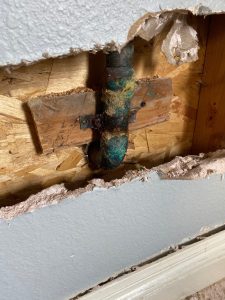Insurance for homes with claims
There are a lot of homeowners that struggle to find insurance for homes with claims.
What do I do when I file a claim on my homeowners insurance policy and then my company drops, or doesn’t renew, my policy because of the claim? Isn’t that what my insurance is for?
This is one of the most common questions we get in our agency. After you have had a loss it can be difficult to find insurance for homes with claims. Here we will discuss why this is the case.
If you’re just looking for homeowners insurance we can get started with just a few questions.
How do insurance companies keep track of claims?
It is important for insurance companies to understand how risky each new home is. Obviously homes that are built near brush fire areas or in hurricane zones are much more likely to suffer a future claim.
Another predictor of future claims are prior claims. Homes that have suffered prior claims are more likely to have future claims.
This may be due to homeowner neglect, construction quality, age of the home, or location of the home.
Insurance companies all report their claim data to a central database known as the Comprehensive Loss Underwriting Exchange, or CLUE for short. CLUE reports are provided by a company called Lexis Nexis and you can contact them to inquiry about any discrepancies on your own CLUE report.
Whenever a new home insurance application is submitted the new company will order a CLUE report to see if there are any claims for that address or for the property owner. Understanding prior claim history will help the company decide if the new home is eligible according to their underwriting guidelines and how much premium should be charged.
How do claims affect my homeowners insurance premium?
This is a question we get a lot in our agency. Clients usually ask this when they are considering making a smaller claim.
The problem is that homeowners insurance rating variables are very complex and vary widely between insurance companies. Even though rating variables have to be filed with the state division of insurance, it is nearly impossible to make sense of all of the rating factors.
Most insurance companies will surcharge your next renewal anywhere from 10-40% for having a claim. It depends on the type of claim, i.e. water, fire, theft, etc., and the severity of the claim, or how much was paid out.
It is not typical for an insurance company to drop your policy, or non-renew the policy, after you have a single claim. If you start to make frequent claims then the company may elect to non-renew your policy.
Each state has different laws as to how much notice the insurance company is required to send you for a non-renewal. In the state of Nevada the insurance company must send the non-renewal notice to you no less than 60 days prior to your policy expiration.
When you have had a claim on your home insurance policy it is usually the best to stay with your current company. New companies are going to surcharge their premium more than your current company, in most cases.
Which kinds of claims are hardest to overcome?

At the time this article is being written, 2019, the answer to this question is easy. Non-weather water claims are by far the hardest kinds of claims to overcome.
We discuss claims with all of our insurance companies and we hear that non-weather water claims are what challenge them the most right now.
Water claims are the trickiest kinds of claims for insurance companies to adjust and settle. Most insurance policies are written with the intent to cover water claims that are sudden and accidental. For example, if you come home from work and find that your upstairs washing machine fitting failed and caused a leak.
The insurance policy will cover the resulting damage to your flooring, drywall and baseboards, and furniture but will not pay to make the actual plumbing repair.
Where water claims get tricky are the slow leaks that are nearly impossible to detect. Most insurance policies contain language that excludes water damage if it is caused by a leak over a period of 14 days or more.

Claims adjusters will look for signs of mold and plumbing evidence to determine whether the leak has been occurring for a long period of time.
Other kinds of claims, such as fire, theft and wind, are not as frequent and are easier to predict. For this reason we usually do not see companies non-renewing home insurance policies that have had these kinds of claims.
What are my options if I am being dropped for claims?
If you have had claims and your home insurance company is dropping your policy, or non-renewing your policy, you may find yourself struggling for a solution.
When you apply for a new home insurance policy the new company is going to ask whether you have been cancelled or non-renewed in the last 3 years. When you answer yes and explain the reason is due to claims then you probably will not be eligible with other companies.
Also remember that the new insurance company is going to check your CLUE report and will see exactly what claims you have had and how much was paid out.
Our agency has many alternative options specifically designed for homes that have had claims. These insurance companies are still highly rated and have rated their policies to adequately collect premium for higher risk homes.
You will usually be able to obtain most of the coverage options that you had previously, although your premium will usually be about 25%-50% higher. There are also less available coverage options, or bells and whistles, on these kinds of policies.
So if you are looking for insurance for homes with claims then our agency is ready to help you.
Can I just let the mortgage company force place the insurance?
If you do not replace your home insurance after you are cancelled or dropped then the mortgage company will force place a policy for you to protect their interest in the property.
There are a few problems with this kind of insurance.
- You are not the policy owner.
- The policy only covers the structure. You have no coverage for your contents, loss of use, medical or liability like a standard homeowners insurance policy offers.
- The premiums are much higher.
- If you’re used to saving on your auto insurance by packaging then you will lose those discounts.
So, letting the mortgage company solve the problem of insurance for homes with claims is not the best solution. You are best to work with your independent insurance agent to find the best solution.
